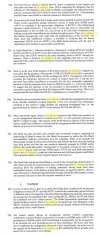Well quite, not sure why anyone would draw any conclusions from total revenue as a multiple of social media following. Commercial income, maybe, and if anyone looked at that, they would see City are at the high end, but Bayern, Spurs, Dortmund and PSG are all higher than City. Seems they have some pretty good commercial people too.
Actually, commercial income as a proportion of broadcast income may be the best indication of commercial prowess, including as it does both monies for success and for global coverage. I may have a look at that ....
I had a look at this, if anyone is interested. My rationale was this: commercial income should follow two things: success on the pitch and visibility to domestic and global audiences. I have equated these two with broadcast income (the more success, the bigger share of broadcast income; the better access to domestic/global audiences, the bigger share of broadcast income).
Now if we make league tables of commercial income and broadcast income, there is a strong correlation between the places in each, mostly within a couple of places of each other.
In 2022, the exceptions are:
City are first in broadcast income but only fourth in commercial income. The opposite of overstated commercial income, this shows more that our performance has been exceptional. I would argue there is a pretty good reason for that. His name is Josep.
Bayern are first in commercial income and seventh in broadcast income, indicating that their commercial income is out of line with their success and global reach. Nothing to do with their shareholder sponsorships, I imagine.
PSG are second in commercial income and eighth in broadcast income. I think we all know why their commercial income is so high compared to their success and global reach. Qatar (cough).
Liverpool are interesting. They are seventh in commercial income and fourth in broadcast income. The previous two years they were seventh/second and seventh/first. This means either they are weak commercially, or over performing as a team, possibly both. As I am attributing slanderous reasons to each club, I will go with asthma inhalers and energy drinks for Liverpool.
Chelsea are also interesting. Only ninth in commercial income but third in broadcast income. Why the discrepancy? Maybe no-one wanted to be associated with Abramovich even before Ukraine?
The others' positions in these "tables" in 2022 were: Real third/second; Barcelona fifth/fifth; United sixth/sixth; Juve eighth/ninth; Spuds tenth/tenth.
Conclusion? It's all a load of bollocks, of course, but it is as good as Crafton and Harris, the financial experts, casting aspersions on our commercial income.



